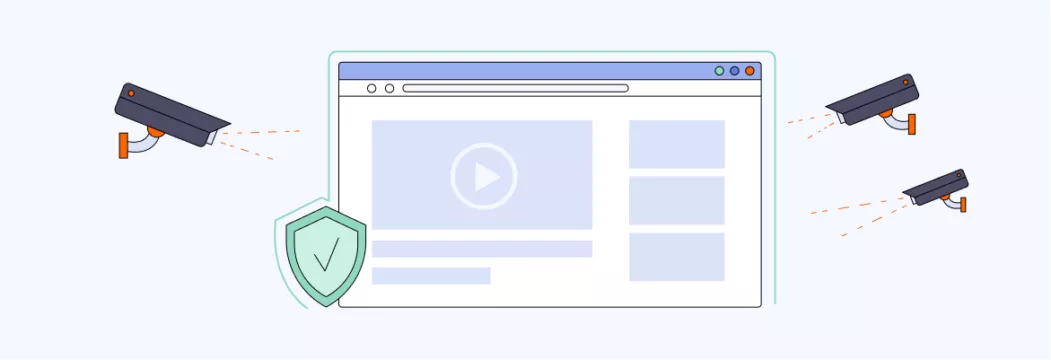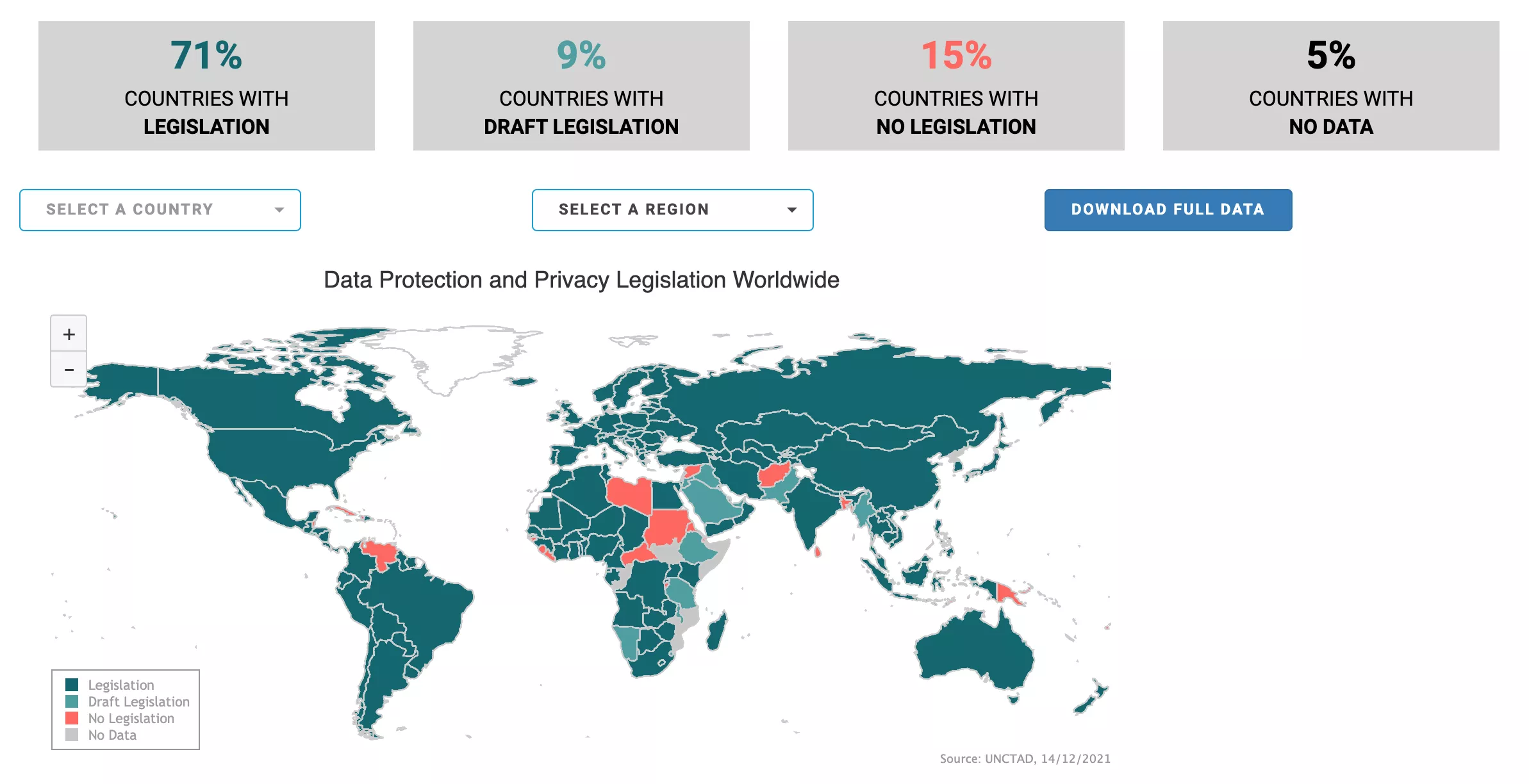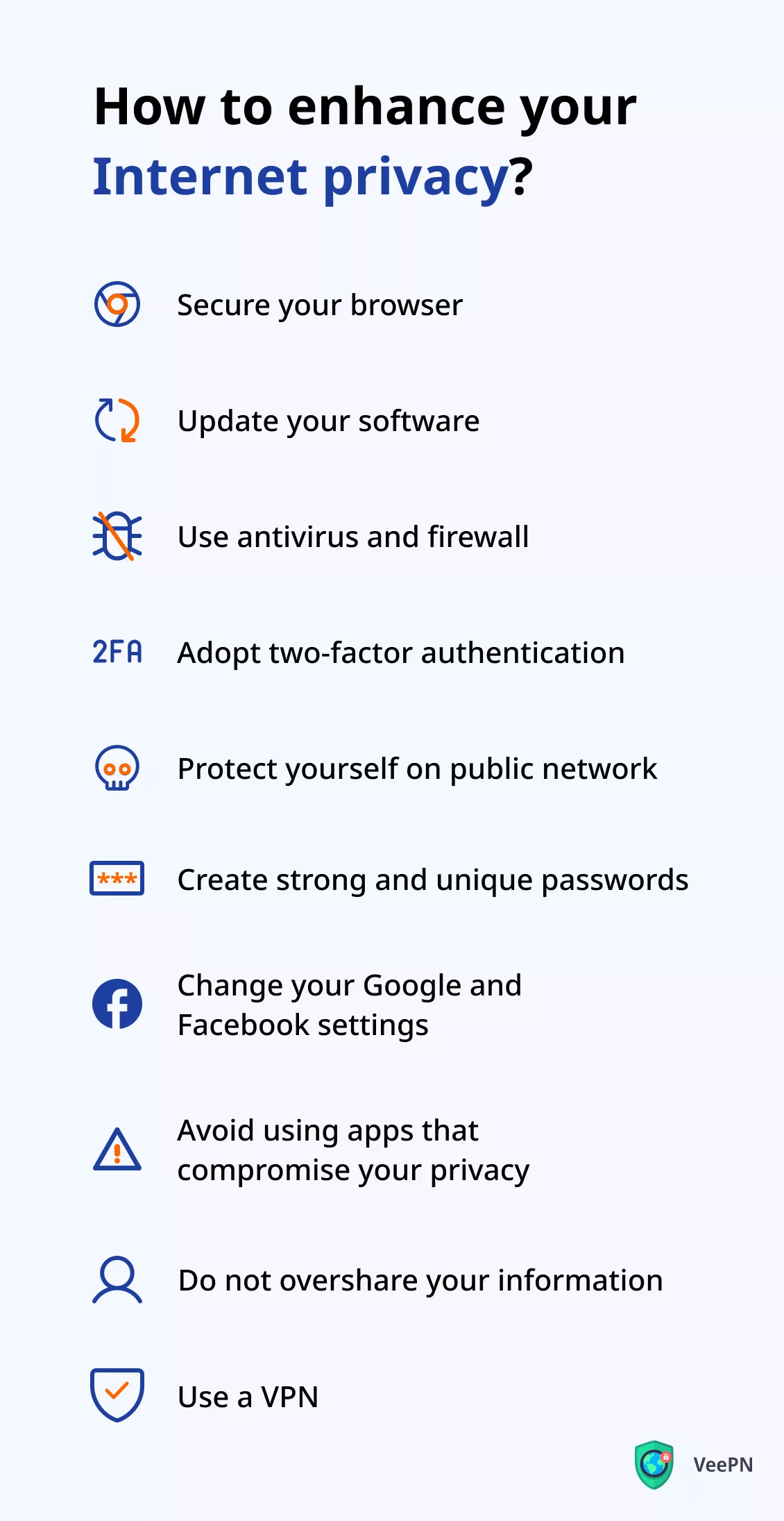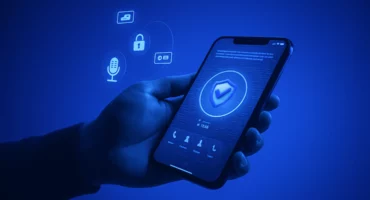What Is Online Privacy: Definition, Tips, Issues
Do you really care about your online privacy? If the answer is “not so much,” you may just be unaware of all those snoopers, hackers, and other third parties trying to collect and compromise your personal data on the web – maybe even at this very moment. So read along to learn what Internet privacy is and how to enhance it.

Internet privacy has become one of the most critical concerns these days. According to the Pew Research survey, over 80% of Americans feel they lack control over their data collected online by companies and the government. Moreover, 70% of the respondents are worried about how this information is used, and nearly 60% of them don’t fully understand what they can do to resolve this challenge.
At the same time, many users do not pay enough attention to their online privacy. This results in numerous cybersecurity risks, from ID theft to personal data exposure and unwanted third-party monitoring. Keep reading to learn what Internet privacy really is, why it matters, and how to protect your identity and personal information on the web.
What is online privacy?
Let’s kick off with the online privacy definition. Online privacy, also known as Internet privacy or digital privacy, is the ability to control how much of your information (such as browsing, financial, and potentially sensitive personal data) third parties can collect and use when you go online. In other words, it’s your right to determine which data to share or not while browsing.
Many users confuse Internet privacy with online security. But while these concepts are somewhat similar, there is a significant difference between them. So before diving deeper into the digital privacy tips and challenges, let’s clarify this misunderstanding once and for all.
Privacy vs. security. The difference explained
Digital privacy is the way online platforms, websites, and applications use, treat, and store your personal information. In contrast, online security refers to our protection against potential cyber threats. These are measures we take to prevent unauthorized access to our accounts, malware attacks, scams, and other Internet dangers.
For example, when you set up certain settings on your smartphone to prevent apps from accessing your data, you take care of your digital privacy. Meanwhile, creating a strong password for your online banking account is an essential cybersecurity measure.
Now that we’ve thrown light on the difference between Internet privacy and security, it’s worth taking a closer look at some specific laws aimed at protecting your identity and personal information online.
Internet privacy regulations
Today, we consider our privacy on the web not a privilege but a basic human right. Here are the two most famous and ultimate laws that prevent online services from violating this principle.
- General Data Protection Regulation (GDPR) is an EU law implemented in May 2018 to regulate Internet users’ privacy. It sets guidelines and rules regarding the collection and processing of customer information. The main principles of GDPR are transparency, fairness, and clear data storage limitations. For instance, all online services should warn users that their information will be collected and allow them to opt out.
- California Consumer Privacy Act (CCPA) is a basic law that allows the citizens of California to control the information businesses and other Internet services collect about them. In particular, it states that users have the right to know how their data is used, prevent it from being sold, and remove the information they share.
Sadly, in many parts of the world, there are still no clear online privacy regulations. According to UNCTAD, data protection and privacy legislation is either draft or missing in 24% of countries.

Besides, some organizations, including big Internet service providers (ISPs), violate those rules and still collect and sell customer information without them knowing. Finally, many Internet users aren’t aware of their online privacy rights and overshare their personal data.
Still not sure if your online privacy really matters? Then let’s consider the most compelling reasons to treat it more seriously.
Why is online privacy important?
In recent years, the importance of Internet privacy has grown tremendously since related cyber threats often put users’ security at enormous risk. While technology advances, people tend to digitize almost all spheres of their lives, from managing their finances to communicating with friends and buying goods. But the more information we share online, the greater the chance for threat actors to compromise it.
For instance, in the healthcare sector alone, the private information of over 42 million people was exposed due to data breaches and hacks in 2021. What’s more, a Verizon survey claims that more than 60% of cyberattacks involve compromised user credentials.
Moreover, not only hackers and ISPs, but also government organizations (from police to CIA), advertising agencies, and even tech giants like Google and Facebook collect and store massive amounts of user data. In particular, the increasing popularity of social networking sites and apps is another reason to treat your online privacy seriously. Such platforms often manipulate users’ opinions and often experience significant data breaches.
All in all, any web service, from Facebook and Instagram to Tinder, PayPal, and even ChatGPT, may lead to cybersecurity challenges if you don’t use it cautiously.
Now, let’s explore those potential issues in more detail.
Main online privacy issues
Here are the most significant privacy-related risks to watch out for.
Online monitoring
Who can track your activities when you go online? Unfortunately, pretty much everyone (of course, unless you take any privacy-enhancing measures – more on that in a bit). Third-party surveillance and unwanted tracking are quite common these days. We’ve already mentioned many parties interested in your private data, including ISPs, search engines, social networks, and websites that use cookies to monitor you. The information they collect includes your browsing habits, location history, likes, comments, and more.
Normally, the reason for third-party monitoring is simple – it’s all about advertising. Ad agencies buy customer data to spread targeted ads. However, in case of a data breach, the outcomes can be much worse than bumping into an annoying pop-up or banner.
Tracking through mobile apps
Just like websites and search engines, mobile applications can learn a lot about us. When you install an app on your smartphone, you provide it with access to a particular amount of your data. And while some permissions are reasonable (especially if you trust the service provider), others may cause certain privacy-related issues. Some applications can even gain access to your camera, microphone, contacts, and other apps you’re using.
Digital identity and data theft
In 2020 alone, the FTC received over 4.7 million customer reports about online scams and other forms of fraud. And identity theft was among the most frequent issues. Cybercriminals develop various schemes, such as phishing, smishing, pharming, and spyware, to trick people into revealing their private information. What next? Well, most likely, they will try to compromise your accounts and steal your funds. Alternatively, threat actors can sell your data on the dark web.
Of course, it’s not the users’ fault that their private information is often compromised on the web. But you have much more impact on your online safety than it seems at first glance. So, to play safe and not let hackers get you, here are several common online habits and bad practices you need to get rid of if you value your private data.
Top 4 anti-privacy habits to avoid
Here are some of the most widespread mistakes leading to online privacy and security issues.
- Using the same password for different accounts. If you have your favorite password and use it for multiple platforms and services, your data has more chances of ending up in the wrong hands. Cybercriminals use a specific technique called credential stuffing to attack numerous user accounts with the same passwords. For instance, if your Facebook credentials were compromised due to a data breach, a hacker may try to use them to break into your banking app account.
- Ignoring Terms and Conditions of web services. Let’s admit it, we hardly ever read those lengthy and boring notifications regarding online services’ Privacy Policies and Terms and Conditions. Simply clicking “I agree” is much easier. However, this is one of the worst online privacy mistakes. From those texts, you can learn how much of your data this service will collect, store, and use.
- Opening unverified links and downloading suspicious files. Imagine you get an email from PayPal support telling you that your account is about to expire. Will you immediately click the link provided to change your password? Well, doing this carelessly is another critical mistake since such an email may appear to be a phishing attempt. Scammers tend to use impersonation techniques to access users’ credentials.
- Using insecure apps and browsers. As mentioned above, many apps are nightmares for privacy-conscious users. The same applies to web browsers as they tend to collect, store, and share customer information. So it’s worth verifying every solution you install and adjusting its security settings.
Now that you know how important your Internet privacy is and what may happen if you neglect it, let’s look at what you can do to protect yourself online.
10 tips on how to protect your online privacy
Here are some simple but efficient ways to prevent your data from being compromised and make your digital footprint nearly untraceable.

1. Secure your browser
The main software you use to enter the Internet is your web browser. So it’s a good idea to make sure that it protects your data and privacy instead of causing some additional headaches. Here are several key tips on how to strengthen your defense at this level.
- Use a privacy-friendly browser. Many popular browsers, including Chrome and Edge, collect tons of user information. Some more secure options are Mozilla Firefox, Brave, and LibreWolf. For more information, check out our article about the best browsers for privacy.
- Manage your browser’s privacy and security settings. You can stop many third-party trackers and monitoring techniques (but not all of them) in your browser’s preferences.
- Regularly clean your browsing history, cookies, and other data. To learn how to do it in a few clicks, read our recent blog post.
2. Update your software
Updating your operating system and software won’t take much time. But this simple trick can save the day when it comes to your online privacy and security. The thing is that developers often fix system vulnerabilities and issues leading to hacks and data thefts. All you have to do is introduce those improvements to your device.
3. Use antivirus software and a firewall
Many forms of malware and viruses are designed to infect your system and steal your data. Some of them may be sitting in your device’s software for weeks or even months, collecting your private information and sending it directly to hackers. That is why installing and regularly updating a powerful antivirus is a must. Another important measure is to activate your device’s firewall to keep yourself away from malicious Internet traffic.
4. Adopt two-factor authentication
Most reliable websites and apps allow users to enhance their safety with the help of the multi-factor or two-factor authentication (2FA) protocol. It’s an additional step one takes when entering a personal account. For instance, when you log into your Instagram, you will not only use your password, but also prove your identity through an SMS sent to your phone.
5. Protect yourself on public networks
Connecting to a public Wi-Fi network while away from home is another noteworthy privacy-related threat. Malicious actors often use unprotected hotspots to conduct man-in-the-middle (MITM) attacks. They put themselves between your device and the network it’s connected to – and then steal your personal information from right under your nose. The best solution against public Wi-Fi dangers is a virtual private network (VPN) – we will discuss the benefits of this powerful tool later on.
6. Create strong passwords
Remember we mentioned password stuffing among the worst online habits for your privacy? Well, apart from not repeating your password on different accounts, here are some more tips in this regard.
- Use strong passwords that contain letters (upper and lower case), numbers, and symbols. Don’t use your personal information or dictionary words in it.
- Regularly update your credentials.
- Store your passwords in a safe place. You can use a password manager tool like LastPass, MacPass, or Keeper.
7. Change your Google and Facebook settings
Of course, you may consider using a more privacy-focused search engine like DuckDuckGo and removing your Facebook account. But if you’re not ready for such radical changes, you can simply adjust your Google and Facebook settings to prevent them from collecting some of your personal information. To do that, read our comprehensive guides on how to change your Facebook ad preferences and how to turn off ad personalization on Google.
8. Avoid using apps that compromise your privacy
Let’s not beat around the bush here – most apps, even those provided by well-known and reputable service providers, are somewhat harmful to your privacy. We have talked about it in detail in our article about the worst apps for privacy concerns. Here, we will say that this is particularly the case for applications installed from unverified marketplaces. So it’s worth turning to the official ones instead.
Another important thing you can do is manage your apps’ privacy settings. For example, App Sandbox offered by iOS allows users to control what information a particular application can access. A similar solution was recently introduced by Android developers.
9. Do not overshare your information
You wouldn’t reveal your bank credentials, ID card number, or home address to a stranger in the street, would you? The same applies to your private data when you go online. However, it’s less clear who can access and compromise this information on the Internet. So people often neglect those risks. The main takeaway here is, the more personal information you keep to yourself, the better. So try not to overshare when it’s unnecessary, and always check if a website or app is reliable before filling out any forms that require your data.
10. Use a VPN
You can resolve many privacy-related issues on your own. But with a powerful solution at hand protecting your data and digital identity, you will feel much more confident. That’s where a VPN comes into play. This tool will keep you away from numerous online dangers and make your browsing activities invisible to online snoopers, hackers, ISPs, and other third parties. Here are the three main benefits privacy-conscious users can gain with a VPN.
- It protects you from cyber threats. A VPN is an effective way to defend yourself against public network risks, distributed denial-of-service (DDoS) attacks, phishing scams, malicious links, and shady websites.
- It prevents unwanted tracking and surveillance. One of the main purposes of a VPN is to protect you from third-party monitoring. It hides your real IP and alters it with the address of a remote VPN server. So snoopers can’t trace the movement of your traffic and its destination. In particular, no one can see the websites you visit, files you download, and messages you send and receive.
- It encrypts your data. A VPN covers your traffic with reliable encryption. It means that your communications, search queries, and any information you type on the web are transformed into gibberish text no one can understand before it’s decrypted. Besides, VPN protocols ensure a stable and secure connection when your data travels through an encrypted tunnel.
Boost your Internet privacy with VeePN
Looking for a trustworthy tool to take your online privacy to the next level? Check out VeePN! It’s a credible VPN service provider with many helpful security features to benefit from. In particular, NetGuard blocks unwanted ads, prevents third-party monitoring, and protects you from cyber threats. Kill Switch helps you avoid data leakage in case your VPN connection fails. Finally, Double VPN allows you to connect to two VPN servers simultaneously and upscale your data protection. On top of that, VeePN provides AES-256 encryption, which is the most advanced solution to date.
Try VeePN now to protect your privacy online and browse the web with peace of mind.
FAQ: What Is Online Privacy
Online privacy is your ability to control how much of your personal information you keep to yourself when surfing the web. It involves your financial information, personal details, browsing history, and so on. In contrast, online security refers to the way you protect yourself from Internet threats, such as malware, hacks, and scams. Read this article to learn more.
Digital privacy refers to many different aspects of your online activities. In particular, these are:
- Protection against third-party monitoring
- Safety of your personal information (passwords, credentials, banking information)
- Limiting access of websites and applications to your data
For more information, check out this article.
The following privacy-related issues are the most significant these days:
- Third-party tracking and surveillance
- Private data and identity theft
- Mobile app monitoring
For more details about online privacy protection, read this article.
VeePN is freedom



